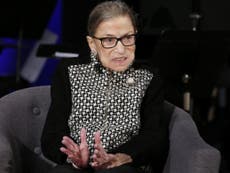Does Trump have enough votes to confirm RBG’s replacement? A look at the senators who might block his nomination
A number of Republican senators have signalled they would not confirm in an election year
Your support helps us to tell the story
From reproductive rights to climate change to Big Tech, The Independent is on the ground when the story is developing. Whether it's investigating the financials of Elon Musk's pro-Trump PAC or producing our latest documentary, 'The A Word', which shines a light on the American women fighting for reproductive rights, we know how important it is to parse out the facts from the messaging.
At such a critical moment in US history, we need reporters on the ground. Your donation allows us to keep sending journalists to speak to both sides of the story.
The Independent is trusted by Americans across the entire political spectrum. And unlike many other quality news outlets, we choose not to lock Americans out of our reporting and analysis with paywalls. We believe quality journalism should be available to everyone, paid for by those who can afford it.
Your support makes all the difference.Republican leaders came forcefully following the death of Supreme Court Justice Ruth Bader Ginsburg to urge their senate colleagues to toe the party line and demand the vacancy is filled before the November election.
Senate Majority Leader Mitch McConnell sent a letter to Republicans on Friday telling them to “keep your powder dry” and avoid falling under pressure to announce their stance on whether the open seat on the nation’s highest court should be filled just six weeks ahead of election day.
“Over the coming days, we are all going to come under tremendous pressure from the press to announce how we will handle the coming nomination,” the senate majority leader wrote to his colleagues. “For those of you who are unsure how to answer, or for those inclined to oppose giving a nominee a vote, I urge you all to keep your powder dry. This is not the time to prematurely lock yourselves into a position you may later regret.”
The senate leader appears to be keen to get ahead of any potential rebel Republicans who might opt to vote against confirming a justice before November. The Republican-led senate would require just 51 votes in order to successfully confirm the next Supreme Court justice after its voting procedures were changed to allow for a simple majority in 2017.
Numerous Republicans on Capitol Hill have spoken out against filling a vacant seat on the Supreme Court during an election year prior to Ms Ginsburg’s death.
Many of those senators spoke on-record about their opposition to filling such an important role ahead of a national election after Republicans refused to hold confirmation hearings for Barack Obama’s Supreme Court nominee, judge Merrick Garland, in 2016.
As recently as September, Senator Lisa Murkowski said she would not vote for Ms Ginsburg’s replacement ahead of an election, saying: “Fair is Fair.”
Senator Susan Collins reportedly said just this month that she would not vote for a Supreme Court nominee in October, telling the New York Times: “I think that’s too close, I really do.”
Several other senators may oppose filling the seat under such extraordinary circumstances, including Mitt Romney, though it remains unclear whether he plans to participate in a vote. His communications director referred to claims on Friday night that he would not confirm a nominee until after Inauguration Day as “grossly false”.
If the confirmation process were to drag on through the election, there is also a chance senators could be replaced with Democrats unlikely to vote for the president’s nominee. Martha McSally, an Arizona senator trailing behind her Democratic opponent Mark Kelly, has called for the confirmation process to take place before election day.
Some Republicans have alleged there were discrepancies between 2016 and now that would allow them to vote on a nominee put forth by Donald Trump this close to an election.
They said the tradition not to hold confirmation hearings for a Supreme Court justice stemmed from a 1992 speech by then-senator Joe Biden, in which he said the president should wait until after the election to nominate a justice since he was a Republican incumbent with a Democratic-led senate.
However, Mr Biden also suggested in that speech that the president should nominate a moderate justice if he chose to move forward with the confirmation process that would be acceptable to the Democratic senate.
Senator Chuck Grassley suggested he would not vote for a nominee ahead of an election, saying in July: “I'm just following what was established by the Biden Rule in 1986 and then emphasized by him in 1992... They set the pattern. I didn't set the pattern. But it was very legitimate that you can't have one rule for Democratic presidents and another rule for Republican presidents."
The senate majority leader also referenced the “Biden rule” in his letter on Friday, writing: “We followed the Biden Rule in 2016, which provided that the Senate will not fill Supreme Court vacancies that arise in presidential election years when the presidency and the Senate majority are held by opposing parties.”





Join our commenting forum
Join thought-provoking conversations, follow other Independent readers and see their replies
Comments